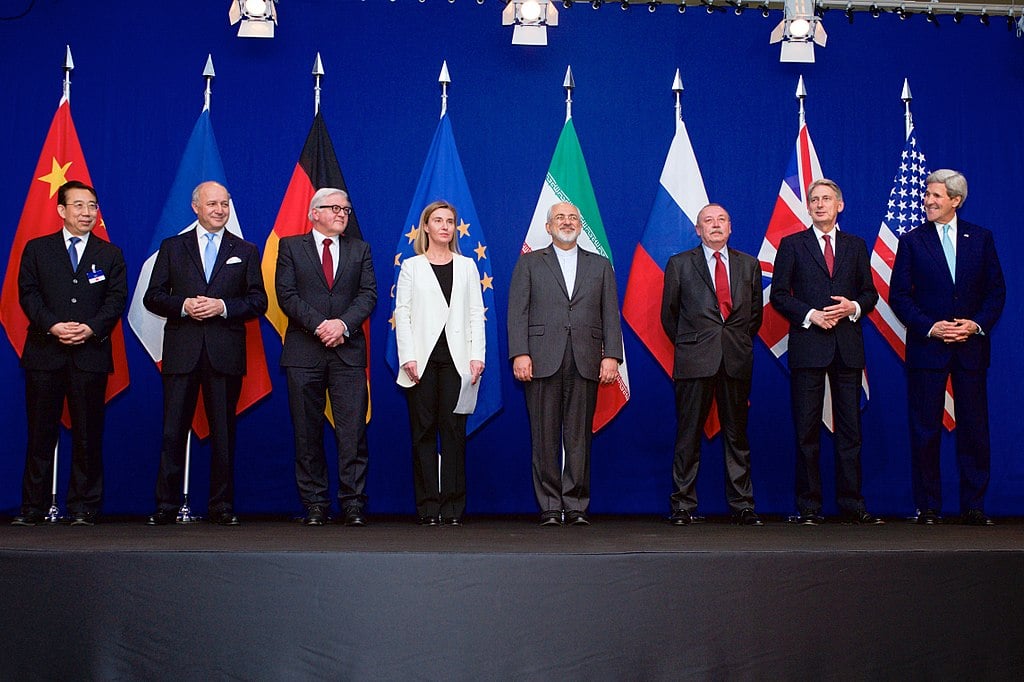While campaigning in 2016, Donald Trump often criticised the Iran nuclear deal as an abject failure for the US and even threatened last month to pull out of the deal entirely. Now it seems Iranian officials believe the deal was also a failure for them.
While giving a speech at Chatham House on Thursday Iranian Deputy Foreign Minister Abbas Araqchi spoke about the Joint Comprehensive Plan of Action (JCPOA) better known as the Iran nuclear deal. In his speech at the London think tank, Araqchi said they will withdraw from the deal if it doesn’t begin to see some concrete economic benefits.
Iran’s threat to leave the JCPOA comes a little more than a month after President Trump announced on January 12 the US would leave the nuclear deal unless the “deal’s disastrous flaws” were fixed.
What is the Iran Nuclear Deal?
The Iran nuclear deal or JCPOA was an agreement reached in 2015 between the Islamic Republic of Iran and the United Kingdom, the United States, Germany, France, China, Russia, and the European Union. These powers are referred as the P5+1 powers because they are comprised of the five permanent members of the UN Security Council plus Germany.
In exchange for Iran imposing limits on their nuclear program and agreeing to external monitoring, the EU, the United States, and the UN Security Council all agreed to remove sanctions on Iran that were related to their nuclear program.
The nuclear deal, however, did not do much to ease tensions between the US and Iran. Shortly after, Araqchi pointed out in a television appearance that the nuclear deal would not inhibit Iranian arms production and that the government would continue to arm Iranian allies in the region, “We have told them [the P5+1 world powers] in the negotiations that we will supply arms to anyone and anywhere necessary and will import weapons from anywhere we want and we have clarified this during the negotiations.”
Supreme Leader Ayatollah Ali Khamenei echoed these statements, saying, “Our policy will not change with regards to the arrogant US government.”
President Barack Obama was seen as spearheading the nuclear deal, something President Trump has often pointed out. Obama said at the time that the nuclear deal was a moment of “historic understanding” between Iran and the US.
Iran’s Issues
Although the US and the EU have lifted sanction against Iran, allowing businesses and banks to do business there, the Islamic Republic reports they have not seen the economic benefits they expected after agreeing to curb their nuclear program.
Instead, they have found that banks are hesitant to do business with them. Iran has claimed that this is because the banks have expressed trepidation over accidentally violating the US sanctions that are still in place.
“If the same policy of confusion and uncertainties about the JCPOA continues, if companies and banks are not working with Iran, we cannot remain in a deal that has no benefit for us. That’s a fact,” Araqchi said.
Despite insistence from the Iranian side that they have not seen economic benefits from the deal, President Trump has pointed out that they received cold hard cash from the Obama administration. President Trump claims the Iranian government has received a “windfall” of $100 billion, $1.8 billion of which was received in cash.
Trumps’ Qualms
President Trump has pointed out three major issues he sees in the Iran nuclear deal. For one, he believes the nuclear deal fails to cement a solution to Iran’s ballistic missile program. President Trump also questions the agreed upon terms under which Iran’s nuclear facilities can be inspected by international authorities. Finally, President Trump takes issue with the “sunset” clauses which stipulate that limitations on the Iranian nuclear program begin to expire after 10 years.
On January 12, President Trump issued a statement on the nuclear deal in which he announced 14 new sanctions against Iran. The President didn’t mince words, opening the statement by saying, “The Iranian regime is the world’s leading state sponsor of terror.”
President Trump stated that unless fresh legislation is signed that includes four provisions, the US will walk away from the deal. The four provisions are as follows:
“First, it must demand that Iran allow immediate inspections at all sites requested by international inspectors.
Second, it must ensure that Iran never even comes close to possessing a nuclear weapon.
Third, unlike the nuclear deal, these provisions must have no expiration date. My policy is to deny Iran all paths to a nuclear weapon—not just for ten years, but forever…
Fourth, the legislation must explicitly state in United States law—for the first time—that long-range missile and nuclear weapons programs are inseparable, and that Iran’s development and testing of missiles should be subject to severe sanctions.”
President Trump has said if these conditions are not met, he would bring back the old sanctions that were so crippling to the Iranian economy.
In response to these statements by the American President, Araqchi said at Chatham House on Thursday, “The deal would not survive this way even if the ultimatum is passed and waivers are extended.”
Araqchi Rebuts
Araqchi disagrees with President Trump’s accusations, namely that the nuclear deal contains sunset clauses, “There is no sunset clause in the JCPOA. Although the U.S. administration and Trump are talking about sunset clause and that JCPOA is just for 10 years, that is not true. Iran’s commitment in the JCPOA not to go for the nuclear weapons is permanent.”
Araqchi also addressed President Trump’s complaint that the nuclear deal fails to set forth a reasonable solution to Iran’s ballistic missile program. According to Araqchi, the JCPOA is an agreement dealing solely with nuclear nonproliferation. Araqchi stated his belief that adding other elements to the existing nuclear deal “will make other issues more complicated and more difficult to resolve.”
Araqchi underlined the importance of the Iran deal for the international community, “If we lose the JCPOA, we will face another nuclear crisis.”




